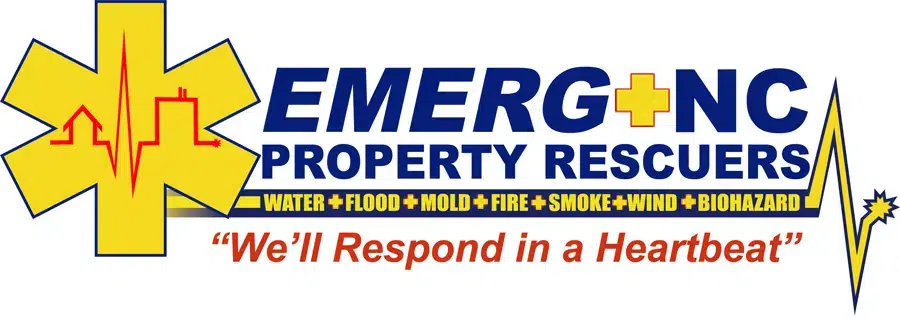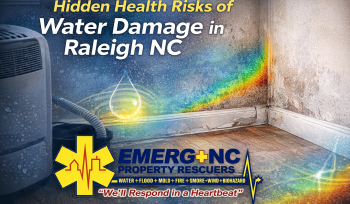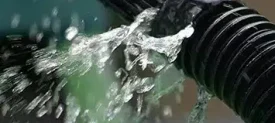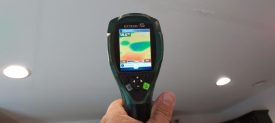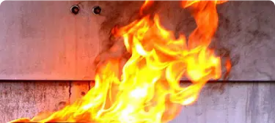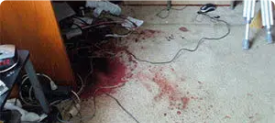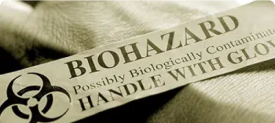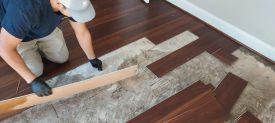Sewer water can contain all types of toxic and hazardous contaminants. Having your property properly cleaned can help ensure the health safety of your family and/or employees. Answers to the most frequently asked questions regarding Sewer Backup by EMERG-NC Property Rescuers.
Is it safe for my family to be in here after a sewer backup?
Answer: No. Water that comes from a beyond a trap (p-trap) of a sewer system needs to be treated as a health hazardous situation. Category 3, also known as black water, is grossly contaminated and can contain pathogenic, toxigenic or other harmful agents.
What are the hazards with sewer backups?
Answer: According to the IICRC S500 Standard 3rd Edition, there are over 120 different viruses that can be excreted in human feces and urine and find their way into sewage. These can include Rotavirus, causing severe and sometimes life-threatening diarrhea in children, Adenoviruses, causing respiratory and eye infections, and Norovirus, a significant cause of gastric flu or stomach flu. There are highly infectious parasitic agents like Giardia and Cryptosporidium that can cause chronic and severe intestinal diseases in both children and adults. Bacterial pathogens in sewage can include Salmonella, Shigella and Escherichia coli. These gram-negative organisms contain endotoxins that are released at the time of cell death and destruction. Endotoxins can cause respiratory inflammation, airway restriction, create the potential allergic and infectious disease responses and when inhaled they may adversely influence the central nervous system.
Can I just clean up a sewer backup myself?
Answer: Improper remediation activities to clean and restore property can cause more and bigger problems. It is possible to spread the contaminated sewer problem from one room to other rooms very easily. Knowing how to remove and clean a sewer backup is essential for a successful restoration of your property. It would be a good idea to consult with a professional experienced and preferably certified in sewer restoration.
Can I just use bleach to clean up a sewer backup?
Answer: Although bleach is a common solution for most people, it is a poor solution for sewer backups. It may do a good job of making stains disappear, however it does a poor job of making the contamination of sewer (category 3) water disappear. We understand that the label may say “It kills 99% of common household germs.” We just don’t think that contamination from sewer water falls under the category of “common household germs.” We had a customer who cleaned up a sewer backup with bleach twice. Once we were hired we had a certified industrial hygienist inspect the house for and he still found high levels of contamination.
What can I keep after a sewer backup?
Answer: Generally, anything that came in contact or possibly came in contact with sewer water that can absorb is usually disposed of. Hard surface items that don’t absorb can be cleaned and restored. Due to all the health hazards of sewer backups we like to operate on the premise “If in doubt, do without!” Is keeping that item worth your health and / or your family’s health?
How do I really know if everything is cleaned up?
Answer: Anyone who says, “Everything is all done, see it looks brand new and smells new too,” is full of crap. Maybe that’s how they cleaned up the sewer backup. The only way to “know” if a sewer backup has been successfully restored is to have it tested. We recommend the services of a certified industrial hygienist who is independent. It’s not a good idea to hire someone to restore your property and then use “their” guy to check it. Look in the phone book or get on the internet and search for a “certified industrial hygienist.”
Let’s suppose your sewer stops up?
Sewer back-ups are normally unexpected and constantly result in a mess. At best the backup requires uncomfortable clean-up and at times costly damage.
Who is going to repair the problem?
That is dependent upon whether the stoppage is your non-public sewer line or town main. If it’s within the City main, the City is going to fix it as quickly as possible and keep you up to date regarding what is being undertaken.
If the condition is with the private sewer connection linking your place to the City main sewer line, we will advise you to get your sewer sewer connection fixed. It is actually against the law for your City to work on private buildings.
Just who will cover this?
The property owner is going to have to pay for the work. For this reason one must always make certain your homeowner’s insurance policy covers sewer backups.
Can the City do anything at all that is going to help my family?
Absolutely! City crews will help with the immediate cleanup to deal with community medical issues.
Is the City going to compensate my family for any damage if the back up is within the City main sewer sewer connection?
On the condition that we had advance information that the City main had been responsible,and also that we did not fix the problem.
Is this the City’s policy or law?
- This is law, public resources can not be paid out meant for non-public purposes.
- The City will be liable for its real estate, not your connection to the primary.
- The City will only be responsible for loss if we learned there was a problem & did not fix it inside a reasonable time frame.
How can I discover if I will be reimbursed?
In the case the sewer stoppage isn’t upon your private sewer connection, you may register a claim. The lawyers will research it to discover if City is liable which includes prior notice on the City sewer system’s problem.
Homewoner accountability for the sewer sewer line runs past the real estate line and even completely to the location where the sewer connects in to the City main.
Preventative Measures
Install a backflow valve to prevent sewer backups. City ordinance will involve a backflow control device on brand new along with newly-repaired sewer lines. However , you may get a plumber add a backflow valve to your sewer connection right now. It’s the ideal safeguard to protect against sewer sewer backups.
A backflow control device can stop sewage from backing up into your house. Clean it regularly to keep it functioning. The valve closes any time waters comes in it from the wrong course. Should a clog take place, the backflow control device should stop the sewage from backing up inside your household. For anybody who is downhill from the sewer main, ensure that a backflow control device has been put on your sewer connection – particularly when your household is due to an older area of the community. Regardless if your house is at a borderline location, installing a backflow valve can be a great precaution. Once the valve is installed, thoroughly clean it every now and then to have it operating right.
Ensure that you own adequate insurance coverage
Sewer backups may not be routinely included in most homeowner’s insurance plan plans. Check your coverage to be sure that you will be insured for damages or injuries resulting from sewer backups.
Don’t forget, the City will not be an insurance provider. The City may just pay for damages or injuries with extremely limited circumstances put down for legal reasons.
Don’t expect you’re protected! You need a specific choice for protection. Talk to your insurance policy broker.
Prevent potential sewer backups
- Call EMERG-NC Property Rescuers at the initial sign of a issue – before the sewer backs up. If your drains are functioning poor, as an example, contact us. We will come and investigate the sewer.
- Dump oil as well as fats using your trash can, certainly not down the drain. Although you may run it through a trash disposal, grease in drains can accumulate and harden directly into a plug.
- Grow trees and large shrubs away from sewer lines. Plant’s roots grow towards breaks or cracks in lines. Whenever plants roots get within the line, they block the line.
- Never connect French drains, sump pumps, or other flood regulating systems on your sanitary sewer. It is illegal as well as the trash and silt will clot your sewer line. Contact a EMERG-NC Property Rescuers professional to help guide you to assist you with unlawful connections.
